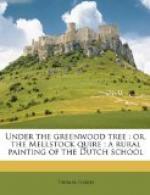Title: Under the Greenwood Tree
Author: Thomas Hardy
Release Date: October 28, 2004 [eBook #2662]
Language: English
Character set encoding: ISO-646-us (us-ASCII)
***Start of the project gutenberg EBOOK under the Greenwood tree***
Transcribed by David Price, email ccx074@coventry.ac.uk from the 1912 Macmillan and Co. edition. Proofed by Margaret Rose Price, Dagny and David Price.
Under the Greenwood tree
or
the Mellstock quire
A rural painting of the Dutch
school
by Thomas Hardy
PREFACE
This story of the Mellstock Quire and its old established west-gallery musicians, with some supplementary descriptions of similar officials in Two on a Tower, A Few Crusted Characters, and other places, is intended to be a fairly true picture, at first hand, of the personages, ways, and customs which were common among such orchestral bodies in the villages of fifty or sixty years ago.
One is inclined to regret the displacement of these ecclesiastical bandsmen by an isolated organist (often at first a barrel-organist) or harmonium player; and despite certain advantages in point of control and accomplishment which were, no doubt, secured by installing the single artist, the change has tended to stultify the professed aims of the clergy, its direct result being to curtail and extinguish the interest of parishioners in church doings. Under the old plan, from half a dozen to ten full-grown players, in addition to the numerous more or less grown-up singers, were officially occupied with the Sunday routine, and concerned in trying their best to make it an artistic outcome of the combined musical taste of the congregation. With a musical executive limited, as it mostly is limited now, to the parson’s wife or daughter and the school-children, or to the school-teacher and the children, an important union of interests has disappeared.
The zest of these bygone instrumentalists must have been keen and staying to take them, as it did, on foot every Sunday after a toilsome week, through all weathers, to the church, which often lay at a distance from their homes. They usually received so little in payment for their performances that their efforts were really a labour of love. In the parish I had in my mind when writing the present tale, the gratuities received yearly by the musicians at Christmas were somewhat as follows: From the manor-house ten shillings and a supper; from the vicar ten shillings; from the farmers five shillings each; from each cottage-household one shilling; amounting altogether to not more than ten shillings a head annually—just enough, as an old executant told me, to pay for their fiddle-strings, repairs, rosin, and music-paper (which they mostly ruled themselves). Their music in those days was all in their own manuscript, copied in the evenings after work, and their music-books were home-bound.




